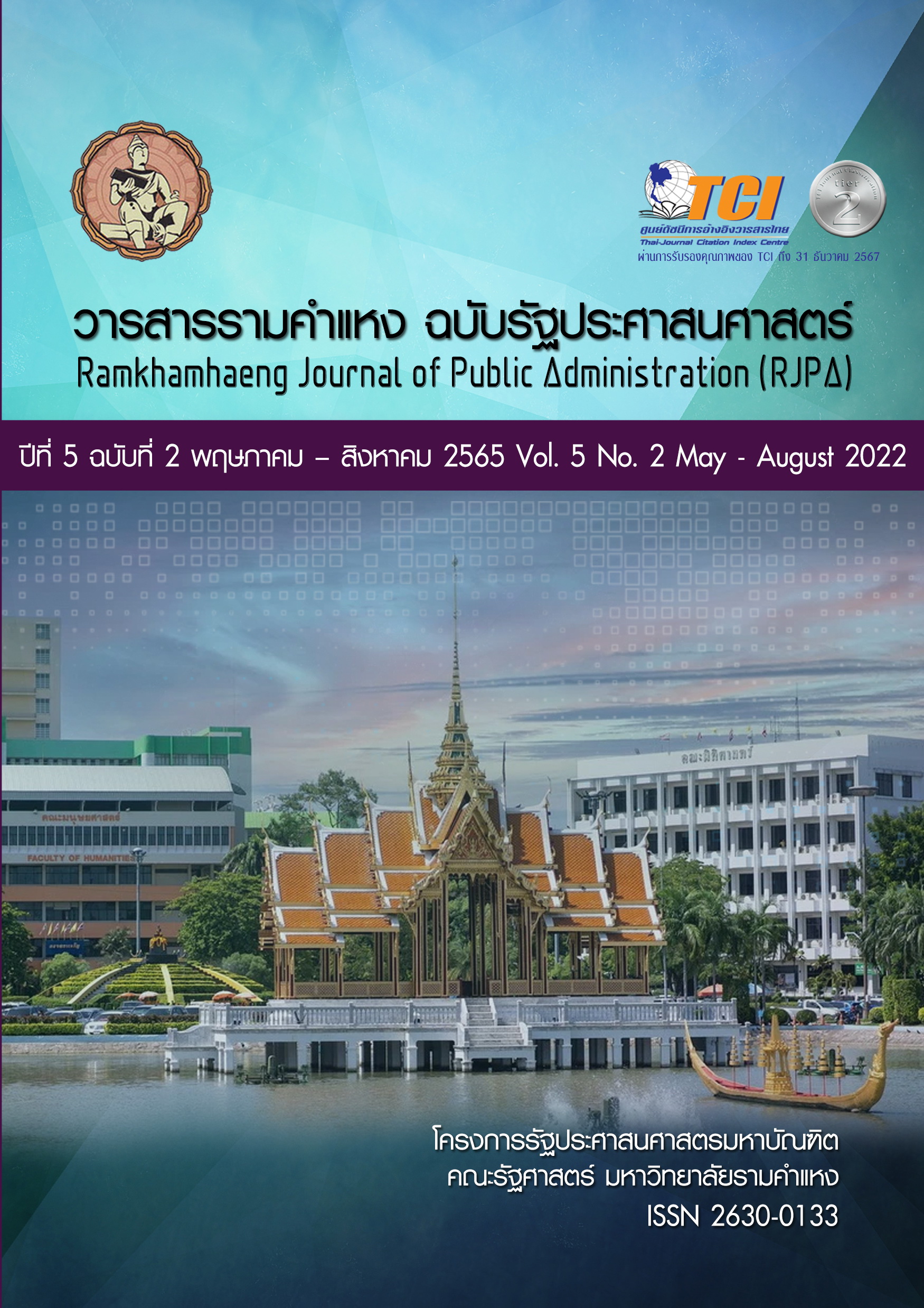Popularity of the Members of the House of the Representative in Thailand
Keywords:
members of the House of the Representative, election, popularityAbstract
The popularity of the members of Thailand's House of Representatives serves the following purposes: (1) explore the political works that helped members of the House of Representatives gain popularity, and (2) design the proposed work model to help members of the House of Representatives gain popularity. It is a qualitative study that collects data from documentary research and interviews key informants who meet the criteria of being a Member of the House of Representatives who has been re-elected four times, in 2005, 2007, 2009, and 2019.
The study finds that, according to objective number 1, the work is separated into pre and post - election. Even after the election, it is essential to continue meeting with the public to gather information and to bond with people (electoral work), alongside the duty of the Member of the House of Representatives (parliamentary work). According to objective number 2, key factors in a Member of the House of Representatives' popularity are: a friendly personality that makes people feel comfortable around them; participation in social activities in their area in person to build trust and confidence from people; the creation of sub-networks in their area; and putting the right man in the right job by entrusting area duties to those with high loyalty and parliamentary duties to those with academic coherence. 3) Creating network or sub-district representatives to help eliminate the need to rely on freelance campaigners during pre-election.
References
คณะกรรมการการเลือกตั้ง. (2562). การเลือกตั้งสมาชิกสภาผู้แทนราษฎร. ค้นเมื่อ 23 มิถุนายน 2562, จาก https://www.ect.go.th/ect_th/news_page.php?nid=865#
ชัยยนต์ ประดิษฐศิลป์ และชัยณรงค์ เครือนวน. (2557). โครงสร้างอำนาจและการกระจุกตัวของความมั่งคั่งในท้องถิ่น: กรณีศึกษาจังหวัดแห่งหนึ่งในภาคตะวันออกโครงสร้างอำนาจและการสะสมทุนในจังหวัดแห่งหนึ่ง. ภายใต้ชุดโครงการวิจัย “สู่สังคมไทยเสมอหน้าการศึกษาโครงสร้างความมั่งคั่งและโครงสร้างอำนาจเพื่อการปฏิรูป”. กรุงเทพฯ: มติชน.
ประจักษ์ ก้องกีรติ. (2554). นิทานสอนใจว่าด้วยความโง่ จน เจ็บของผู้เลือกตั้งชนบท : มายาคติและอคติของนักรัฐศาสตร์ไทย. วารสารฟ้าเดียวกัน, 6(4), 140-155.
พรชัย เทพปัญญา. (2552). นักการเมืองถิ่นจังหวัดชลบุรี. กรุงเทพฯ: สำนักวิจัยและพัฒนา, สถาบันพระปกเกล้า.
พิชญ์ พงษ์สวัสดิ์. (2562). การเมืองเรื่องของแท้. ค้นเมื่อ 20 มกราคม 2563, จาก https://www.matichon.co.th
สถาบันพระปกเกล้า. (2553). บูรณาการงานวิจัย: นักการเมืองถิ่นและพฤติกรรมการเลือกตั้ง 2550. กรุงเทพฯ: สำนักวิจัยและพัฒนา, สถาบันพระปกเกล้า.
สัญญา เคณาภูมิ. (2560). แนวคิดอรรถประโยชน์ทางการเมือง. รัฐสภาสาร, 65(5), 52-82.
อคิน รพีพัฒน์. (2548). การแสดงปาฐกถาพิเศษ ป๋วยอึ๊งภากรณ์ ครั้งที่ 9. กรุงเทพฯ: สามลดา.
อภิชาติ สถิตนิรามัย และคณะ. (2553). รายงานเบื้องต้นโครงการวิจัยการเปลี่ยนแปลงด้านเศรษฐกิจและสังคมของชนชั้นใหม่. กรุงเทพฯ: สถาบันศึกษานโยบายสาธารณะ.
Rabibhadana, Akin (1969). The organization of Thai society in the early Bangkok period, 1782-1873. New York: Cornell University.
Roth, G. & Wittich, C. (1978). Max Webber Economy and Society An Outline of Interpretive Sociology. Berkeley, CA: University of California Press
Downloads
Published
How to Cite
License
Copyright (c) 2025 ศศิธร ธรรมนิมิตเมตตา, พัด ลวางกูร

This work is licensed under a Creative Commons Attribution-NonCommercial-NoDerivatives 4.0 International License.



